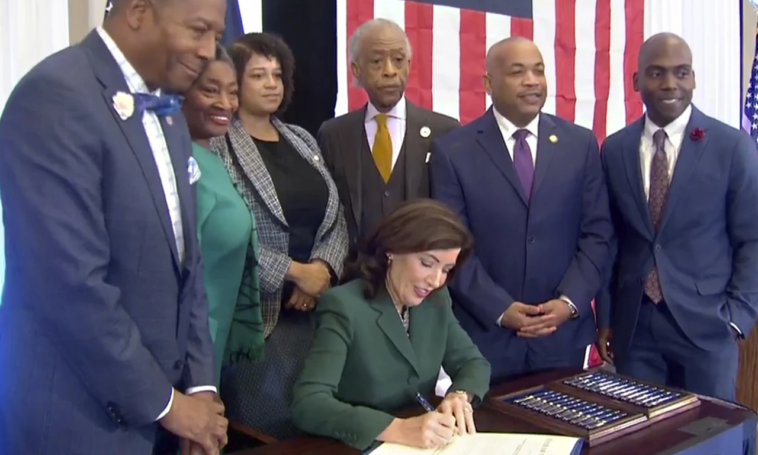New York Governor recently signed a bill establishing the New York State Community Commission on Reparations of Slavery.
This initiative aims to acknowledge the deep-rooted injustices, cruelty, brutality, and inhumanity of slavery within the state. The commission, composed of individuals from diverse professional and personal backgrounds, will undertake a thorough examination of the historical mistreatment of enslaved people.
Despite New York officially abolishing slavery by 1827, the state had already reaped substantial economic benefits from the practice during its earlier years.
Governor Hochul, in her remarks, emphasized the need for the state to confront its entire history, including the uncomfortable truth that New York flourished economically through the institution of slavery.
She stated, “In New York, we like to think we’re on the right side of this. You know, slavery was a product of the South. It’s a confederacy… What is hard to embrace is the fact that our state also flourished from that slavery. It’s not a beautiful story, but indeed it is the truth.”
New York’s move aligns with broader efforts across the United States to explore and implement reparations for historical injustices tied to slavery. In California, a reparations task force has already presented an extensive report with over 100 suggestions after two years of intensive study.
These recommendations, currently under consideration by state lawmakers, aim to support Black families in various ways, including assistance with genealogical research to trace ancestry. However, the potential implementation of these policies faces hurdles due to the state’s budgetary challenges.
Similarly, in 2021, Evanston, a suburb of Chicago, became the first U.S. city to commit to reparations, allocating $10 million over a decade.
The program’s initial phase involves distributing $400,000 to eligible Black households, with each qualifying family receiving $25,000 for housing-related expenses. While this represents a tangible step, debates persist over the effectiveness of such initiatives and their ability to address the broader impacts of historical injustices.
The United Nations Human Rights Office added its voice to the reparations discussion in September, releasing a report calling for reparations to people of African descent in response to the enduring impacts of slavery and colonialism.
The report proposed a multipronged approach, including potential monetary reparations, and emphasized the crucial involvement of affected communities in the design and implementation of reparatory justice measures.
However, as with any complex and sensitive issue, there are concerns about the feasibility and scope of reparations for slavery, particularly given the significant financial implications.
Alderman Cicely Fleming, the sole opposing vote in Evanston’s reparations program in 2021, voiced substantial concerns over the initiative’s approach. While supporting the concept of reparations wholeheartedly, Fleming criticized the program as a housing policy masquerading as reparations.
She argued that the resolution prescribed to Black residents what they needed and the means of receiving it, rather than providing them with the autonomy to decide for themselves.
These concerns highlight the nuanced nature of reparations discussions, where there is no one-size-fits-all solution. The financial implications of reparations have been a point of contention, with critics questioning the feasibility of implementing widespread reparatory measures without disproportionately impacting state budgets.
Despite the challenges, the growing momentum behind reparations initiatives underscores a broader societal acknowledgment of the need to address historical injustices and their lasting effects.
Advocates argue that reparations not only provide tangible support to communities that have historically suffered but also serve as a crucial step towards reconciling with the past and fostering a more equitable future.




2 Comments
Leave a Reply2 Pings & Trackbacks
Pingback:Minister escorted from North Carolina movie theater after..
Pingback:Biden-Harris campaign hires director of Black media